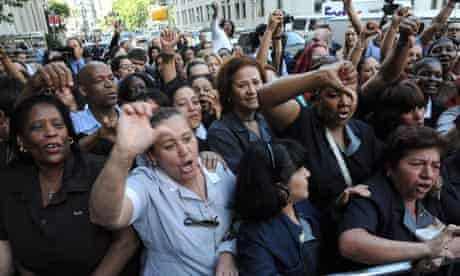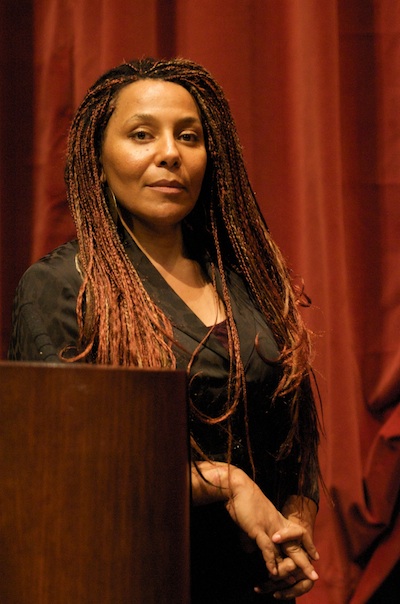Room 2806: The Accusation
Yes, We Wanna Talk About the Sexual Assault Case Against French Politician Dominique Strauss-Kahn
By Angela Marie MacDougall
In early December 2020 during COVID-19 sanctioned isolation and work from home, I was speaking with my daughter, Leona sharing our watched and to watch list and she had just watched Room 2806: The Accusation suggesting I check it out. Room 2806: The Accusation, directed by Jalil Lespert, is a four-episode Netflix docuseries reprising the May 2011 sexualized violence incident involving Dominique Strauss-Kahn, then the managing director of the International Monetary Fund (IMF), perhaps the most powerful global financial institution, a prospective candidate for the French presidency and a Sofitel room attendant, Nafissatou Diallo a West African widow and mother of a 15-year-old girl. Leona wondered if I knew about the injustice surrounding the Sofitel event that had her “yelling at the TV.” Oh, I remembered this incident well and was glued to news reports leading up to his arrest, the textbook victim-blaming deployed by the high powered defence team facilitated by the news media that resulted in the eventual withdrawal of the criminal case by the prosecutor. Given the work of Battered Women’s Support Services (BWSS) in working from an intersectional and feminist decolonial perspective, I was deeply attuned to the race, class and gender dynamics in effect that makes it a steep hill to climb to see “justice” in any criminal legal sense in particular for a Black immigrant woman against a powerful white man. On a rainy Vancouver night in December 2020, I binged 2806: The Accusation in one sitting to see for myself if this docuseries would do justice to the injustice of the Sofitel event.
Wanna Talk About it?
The opening credits include a link to Wanna Talk About It? Early in September 2020, a representative from Netflix Canada messaged me on LinkedIn about a website they were creating that would point their viewer to when film titles addressed topics like sexualized and intimate personal violence. Their goal is to be able to provide their viewers with resources on these matters and help them seek help if they are experiencing something similar. The site is global so they wanted to point viewers to local organizations in the countries where they live. I consulted with our team and we agreed for Netflix to link to the anti-violence centres page on the BWSS website. At BWSS, we are pleased to be part of any positive shift in entertainment media and as active participants in Me Too, Black Lives Matter and Idle No More we know the importance of social, news and entertainment media in driving social-cultural change profoundly impacting people while igniting the hard and necessary conversations and truth-telling on longstanding social issues. Social issues like sexualized violence of hotel room attendants in luxury hotels in global cities like New York, Toronto and Vancouver.
Room attendants perform the most physically demanding work necessary to operate a luxury hotel. Assigned 10 to 15 rooms a day on average, they strip beds, dump sheets down laundry chutes, remake beds, scrub bathroom floors, clean tubs and toilets, empty trash, polish mirrors, clean glasses, vacuum carpets. According to Unite Here a union representing hotel workers, in 2006, there were 1.3 million hotel workers in the United States and 280,000 in Canada, of whom, approximately one quarter are room attendants. In general, the hotel industry is dependent on cheap, racialized and gendered work; the result has meant profound vulnerability to sexualized violence for immigrant, Black and women of colour who are over-represented in this industry. The hotel industry and the allocation of “dirty work”, cleaning and laundry, is segmented along lines of race and gender. A staggering 93 percent of cleaning and laundry staff are Black and/or immigrants, 82 percent are racialized people and 80 percent are women.
Historically, slavery and indentured labour existed because there was a social and economic system that justified race as a necessary means of procuring free and cheap labour. Racial domination under colonialism to current day capitalism is the source of the racialized division of labour and the equation is simple: the cheaper the labour inputs equals the higher the profits. This is reflective in the low wages and lack of benefits earned by room attendants. Given the gendered power relations and the isolated nature of women hotel room attendants’ working environments, guest‐initiated sexualized violence experienced by room attendants is a significant, under‐examined problem. Sexualized violence is a continuum, ranging from unwanted verbal comments, jokes, nudity and sexual gestures including masturbation, to actions encompassing touching, coercive attempts to establish a sexual interaction and rape. In a broad sense, sexualized violence is a mechanism for maintaining male dominance over women and people of marginalized genders.

Photograph: Andrew Gomberts/EPA
Power is a Central Component of Sexualized Violence
BWSS is based in the ancestral and unceded territories of the xʷməθkʷəy̓əm (Musqueam), Sḵwx̱wú7mesh (Squamish) and səlilwətaɬ (Tsleil-Waututh) nations also known as Vancouver. Hotel workers who access our services have described sexualized violence as systemic throughout various parts of the hotel industry from working the front desk to cleaning rooms. Power is a central component of sexualized violence. The occupation of room attendant has low social status in society, in the workplace compared to the power held by hotel guests making it unsurprising that sexualized violence in hotels is so entrenched.
Room attendants fill a racialized/gendered job where they are expected to be pleasant, accommodating, caring and unobtrusive. Behaviours that fit the “feminine” stereotype and femininity and gender is coded by their dress-style uniform. Women who have accessed BWSS, have described a large contributing factor of their experiences of sexualized violence is because their work takes place in bedrooms, spaces the hotel industry markets as “home away from home”, and for the guests, are considered intimate, personal and potentially eroticized. As with the Room 2806 incident, guests could still be present while rooms were being attended, or might return to their rooms while the attendant was there. Critically, the hotel bedroom offers the abuser a context that is usually devoid of witnesses. As with the Room 2806 incident that despite evidence to the contrary the criminal legal system typically leans on the side of “he said, she said.”
The Power of Solidarity Movements and a Community-Based Response
I had already lamented the social and legal outcome and yelled at the TV so kept expectations low while watching Room 2806. Given the limits and the context, it made sense that Nafissatou Diallo took action toward a resolution that worked for her. Ms. Diallo has experienced persistent, hateful judgements and victim-blaming. While we continue working to hold police and legal systems accountable for their failures across Canada, it should come as no surprise that the gender-based violence sector is moving away from traditional legal and police systems toward a call for strengthening and increased financial investment in community-based responses.
As in 2011, watching Room 2806 I was once again inspired by the images of the room attendant protests outside the court when Dominique Strauss-Kahn appeared surrounded by bodyguards and flanked by his billionaire French wife who after one too many humiliations eventually left him. It warmed my heart to see hundreds of mostly women dressed in their uniforms, black and white or crisp blue gathered there as a demonstration of support and solidarity and resistance and to listen as they roared their disapproval, shouting: “Shame on you.”
Angela Marie MacDougall
 Through her community-based organizing, frontline work and activism over three decades, Angela Marie MacDougall has been deeply involved in movements for social justice. Since the nineties, Angela has developed training curricula from an intersectional and anti-oppression framework while her work as a trainer with community-based organizations, systems players, universities and in the larger public sphere has always emphasized the influence of a community-based response toward gender, racial, economic justice. Angela’s impact includes development of empowerment and advocacy-based program and service delivery models that address gender-based violence and violence against women that are grounded in strong theoretical frameworks that include feminist trauma-informed analysis that integrate the role substance use and mental wellness.
Through her community-based organizing, frontline work and activism over three decades, Angela Marie MacDougall has been deeply involved in movements for social justice. Since the nineties, Angela has developed training curricula from an intersectional and anti-oppression framework while her work as a trainer with community-based organizations, systems players, universities and in the larger public sphere has always emphasized the influence of a community-based response toward gender, racial, economic justice. Angela’s impact includes development of empowerment and advocacy-based program and service delivery models that address gender-based violence and violence against women that are grounded in strong theoretical frameworks that include feminist trauma-informed analysis that integrate the role substance use and mental wellness.
Angela Marie MacDougall has edited and/or written ten manuals on addressing gender-based violence and violence against women from an intersectional anti-oppression feminist framework and has spoken to hundreds of groups throughout Canada, the United States and in China. An ever present theme and focus of her work has been the range of social inequities and environmental problems associated with colonialization and the generalized criminalization of communities of colour that are most affected by poverty and racial discrimination. Her parents met in the Black community known as Hogan’s Alley that in the seventies was razed by Vancouver City Hall, so her work grows directly from her own experiences as a bi-racial Black woman who grew up amongst violent racist misogyny both at home, at school and in the larger community while and she became politicized to end violence against women after her high school friend was raped and murdered while on a date. She also has conducted extensive participatory action research on numerous aspects relating to gender, race and violence.
Angela Marie MacDougall is a founding member of Feminists Deliver a provincial organization dedicated to shedding a light on the urgent issues facing marginalized communities in British Columbia and the grassroots struggles leading the way for transformative change while build transnational connections between grassroots intersectional feminist movements; and re-envisioning the global women’s agenda as one that centers a diversity of grassroots intersectional feminist voices. She is a long standing member of Vancouver’s February 14th Women’s Memorial March, the first women’s memorial march was held in 1992 in response to the murder of a woman in the Vancouver neighbourhood named the Downtown Eastside. Angela is founding member of Intersectional Feminist Justice Research and Organizing Collaborative that brings together researchers, academics, data and policy analysts, students and community organizers to provide critical research, data, policy and strategic support for the ending violence, gender equity and social justice movements. Ms. MacDougall was named a Remarkable Woman by the City of Vancouver and Vancouver Magazine named her one of Vancouver’s most powerful people.
You can find Angela on Twitter @_AngelaMarieMac




